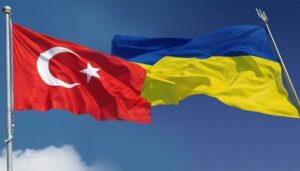
The Council of the European Union has added Argentina, Colombia, Namibia and Peru to the list of countries for which travel restrictions should be lifted. Ukraine also remained on the list of countries for whose residents the EU Council recommends gradually lifting travel restrictions at external borders.
“Following a review under the recommendation on the gradual lifting of the temporary restrictions on non-essential travel into the EU, the Council updated the list of countries, special administrative regions and other entities and territorial authorities for which travel restrictions should be lifted. In particular, Argentina, Colombia, Namibia and Peru were added to the list,” the EU Council said in a statement on the website on Friday.
As stipulated in the Council’s recommendation, this list will continue to be reviewed every two weeks and updated as appropriate.

Ukraine and Turkey are considering the meeting of the Strategic Council between Ukraine and Turkey co-chaired by both presidents in February 2022 as an opportunity to sign a free trade agreement (FTA), Ukrainian Foreign Minister Dmytro Kuleba has said.
“Next year, Ukraine and Turkey will celebrate 30 years since the establishment of diplomatic relations between the two countries. To mark this occasion, we plan to hold the next session of the Strategic Council between Ukraine and Turkey under the co-chairmanship of both presidents. A number of agreements and documents are currently being prepared ahead of next year’s Strategic Council. Both sides see the February 2022 meeting as an opportunity to finally sign a long-awaited Turkish-Ukrainian free trade agreement following years of negotiations,” Kuleba wrote in an article for the Atlantic Council released on Thursday.
Once in force, he said, this free trade deal will significantly boost already strong trade ties between the two Black Sea countries and facilitate the establishment of new business links.
“With bilateral trade steadily growing, we also plan to hold a joint intergovernmental trade and economic commission in the near future,” Kuleba said.
The Ukrainian Foreign Minister also said that Ukraine and Turkey are developing plans to unite forces in the production of Ukrainian Antonov aircraft.
“Our Turkish friends were very impressed with the capabilities of Ukrainian Antonov aircraft for extinguishing fires. During the last meeting with my Turkish counterpart Mevlut Cavusoglu in Lviv in October 2021, he expressed Turkey’s interest in Antonov aircraft. Ukraine welcomes this interest and is ready to explore the possibilities of joint aircraft production Antonov and international exports,” the minister said.
Kuleba said that with the climate crisis escalating, the threat of wildfires in Turkey and dozens of other countries around the globe looks like it is here to stay, along with increased demand for firefighting aviation.
“This makes the proposed aviation industry cooperation between Turkey and Ukraine strategically appealing. We plan to discuss this topic in more depth during our next Quadriga meeting of foreign and defense ministers, which will take place in December 2021 in Ankara,” he said.

Ukraine and Egypt will hold the Intergovernmental Joint Commission on Economic and Scientific and Technical Cooperation in Cairo on December 14 to December 16, the Economy Ministry said on the website, following the meeting of Deputy Economy Minister, Trade Representative of Ukraine Taras Kachka with Egyptian Ambassador to Ukraine Ayman Elgammal.
“We are currently conducting a study on the possibility of concluding an agreement on a free trade area with Egypt. Ukraine is interested in increasing the supply of agricultural and food products, vehicles, electrical equipment, engineering products,” the ministry’s press service said, citing Kachka.
He said that Egypt occupies a leading position among the countries of Africa and the Arab world in terms of trade with Ukraine. According to the results within the period of January-August 2021, trade between the countries amounted to $1.044 billion, for the entire last year to $1.7 billion.
According to the Ukrainian side, a major project of the Egyptian government, namely the construction of the new capital Vedian is interesting concerning the possibility of participation of Ukrainian business.

Ukraine and Switzerland have agreed on mutual recognition of COVID-19 vaccination certificates, Ukrainian Foreign Minister Dmytro Kuleba has said.
“I am also pleased to announce that we have agreed to recognize COVID-19 vaccination certificates for free and safe travel of citizens and businesses,” Kuleba said at a press conference following talks with Federal Adviser, Vice President and Chairman of the Federal Department of Foreign Affairs of the Swiss Confederation Ignazio Cassis in Kyiv on Thursday.
“The exchange of notes has already taken place, and I invite all citizens to the website of the Ministry of Foreign Affairs tripadvisor.mfa.gov.ua, where you will see updated information on the conditions of travel to Switzerland,” the head of the Ukrainian Foreign Ministry added.
The Ukrainian Foreign Minister stressed that the mutual recognition of certificates is a very important step. “First of all, this is a step of trust that exists between our countries,” Kuleba added.

Ukraine will provide assistance to Moldova with gas supplies, Secretary of the National Security and Defense Council (NSDC) Oleksiy Danilov said.
“We decided to instruct the Cabinet of Ministers to consider this issue. We understand that we can do such assistance to the Republic of Moldova in the near future,” Danilov said at a briefing on Friday following the results of the NSDC meeting.
According to him, Prime Minister of Moldova Natalia Gavrilița has made such a request to the Ukrainian government.
“The Prime Minister of Ukraine received a letter from his colleague with a request to help with gas in order to avoid a difficult situation, which has developed taking into account the blackmail that Gazprom is doing there,” Danilov said.
Later, he said that it would be gas on credit, not for money, and then Moldova would return the supplied resource. According to him, this must be done, since Ukraine and Moldova are united, and there are territories in Ukraine that are supplied with gas from Moldova.

Secretary of Defense Lloyd J. Austin, during his visit to Georgia and Ukraine next week, will urge these countries to carry out the transformations necessary to qualify for NATO membership, the Pentagon has said.
“Austin will stress in both Georgia and Ukraine that there is an open door to NATO and encourage the nations to make the changes necessary for them to qualify for membership in the defensive alliance,” the U.S. Department of Defense has reported.
As reported, Austin will visit Romania and Belgium after Ukraine and Georgia. In Brussels, the head of the Pentagon will hold a meeting with the defense ministers of the NATO countries. According to the Pentagon, this meeting is expected to discuss Russia, as well as problems from China.
Earlier, the Pentagon said Austin was going on a trip to Europe that weekend. In Georgia, he will meet with Prime Minister of this country Irakli Garibashvili and Defense Minister Juansher Burchuladze, and in Ukraine with President Volodymyr Zelensky and Defense Minister Andriy Taran.
In Romania he will meet with President Klaus Iohannis and Defense Minister Nicolae-Ionel Ciuca.